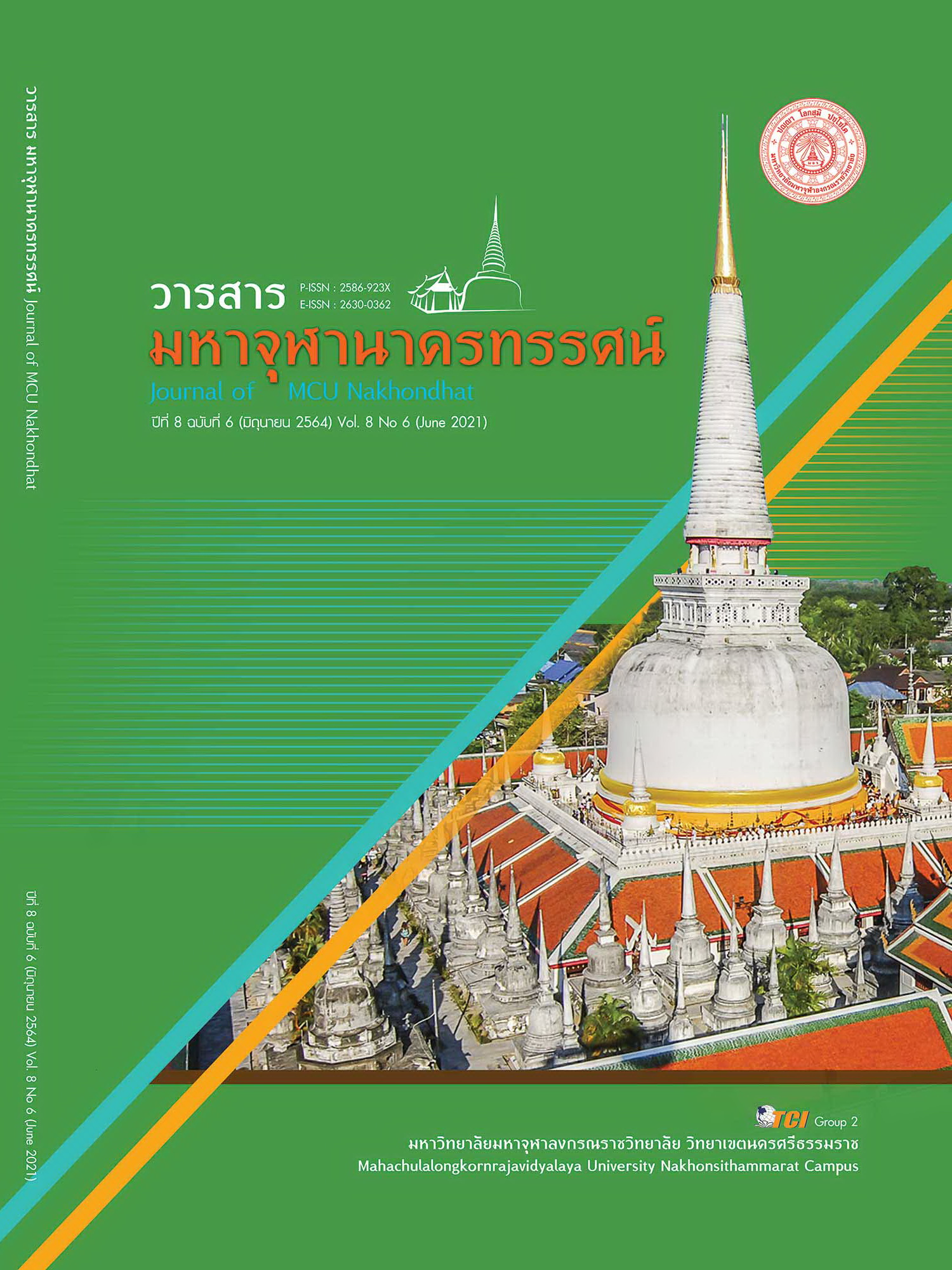INTEGRATING THE PHILOSOPHY OF SUFFICIENCY ECONOMY TO DEVELOP A SUSTAINABLE AGRICULTURAL NETWORK IN NAKHON PATATHOM PROVINCE
Main Article Content
Abstract
This research article of this study were: 1) to analysis the potential capital of safe agricultural network to integrate the philosophy of sustainable sufficiency economy in Nakhon Pathom province. And 2) to develop of guidelines for the development of sustainable safe agricultural network according to the philosophy of sufficiency economy. This research was qualitative research use study of documents, in - depth interviews observing and removing lessons Select a specific sample. The main contributors were divided into 3 groups: 1) Safe Agriculture Network, 2) Government Agencies, and 3) entrepreneurs and consumers total 53 persons. By using analyzed content and summarized as an overview. The research results found that: 1) the potential capital of the agricultural safety network It has received significant support from the government policy that has resulted in the local agricultural sector generating household income. Especially fruit and vegetable plants Spice that tends to increase in line with market demand. Including support from the public and private sectors in driving through the project continuously. Potential grants include: 1.1) cost, area context, 1.2) group leadership, 1.3) communication, 1.4) partner support, and 1.5) continuous learning. And 2) development of sustainable safe agricultural network is to develop capital, potential, area, which networks must know their potential. And external dynamics that are constantly changing, including politics, economics, learning. The entry into the development of sustainability requires applying 3 principles: moderation. Rationality, good immunity and 2 conditions, knowledge and morality. The key success factors that need to be integrated are: consistency, the context of the area and its potential. Being well - aware and working as a network connects with each other
Article Details
References
เครือข่ายเตือนภัยสารเคมีกำจัดศัตรูพืช. (2562). ผลการตรวจสารพิษตกค้างผักผลไม้. เรียกใช้เมื่อ 30 กรกฎาคม 2562 จาก https://www.thaipan.org/action/1107
จิราภรณ์ คชเสนี และนันทนา คชเสนี. (2558). นิเวศวิทยาเพื่อสิ่งแวดล้อม. (พิมพ์ครั้งที่ 2). กรุงเทพมหานคร: สำนักพิมพ์แห่งจุฬาลงกรณมหาวิทยาลัย.
จิรายุ อิศรางกูร ณ อยุธยา และปรียานุช ธรรมปิยา. (2559). ตามรอยพ่อชีวิตพอเพียง ... สู่การพัฒนาที่ยั่งยืน. พิมพ์ครั้งที่ 14. กรุงเทพมหานคร: บริษัทพิมพ์สิริ จำกัด.
บุญชม ศรีสะอาด. (2556). วิธีการทางสถิติสำหรับการวิจัย. (เล่มที่ 2). กรุงเทพมหานคร: สุวีริยาการพิมพ์.
สำนักงานเกษตรและสหกรณ์จังหวัดนครปฐม. (2563). แผนพัฒนาการเกษตรและสหกรณ์ของจังหวัดนครปฐม (พ.ศ. 2561 – 2565) ฉบับทบทวน. นครปฐม: สำนักงานเกษตรและสหกรณ์จังหวัดนครปฐม.
สำนักงานจังหวัดนครปฐม. (2562). แผนพัฒนาจังหวัดนครปฐม. นครปฐม: กลุ่มงานยุทธศาสตร์และข้อมูลเพื่อพัฒนาจังหวัด.
อภิชัย พันธเสน. (2562). เศรษฐกิจพอเพียง: พระอัจฉริยภาพและพระกรุณาธิคุณของในหลวง. พิมพ์ครั้งที่ 2. ปทุมธานี: มหาวิทยาลัยรังสิต.
อาคม เติมพิทยาไพสิฐ. (2557). วิสัยทัศน์และยุทธศาสตร์การพัฒนาประเทศ... สู่ความยั่งยืน. กรุงเทพมหานคร: สำนักงานคณะกรรมการพัฒนาเศรษฐกิจและสังคมแห่งชาติ (สศช.).
อำพล กิตติอำพล. (2560). ปรัชญาของเศรษฐกิจพอเพียงกับสังคมไทย. นนทบุรี: เพชรรุ่งการพิมพ์.
เครือข่ายเกษตรปลอดภัย. (29 สิงหาคม 2563). การบูรณาการหลักปรัชญาของเศรษฐกิจพอเพียงเพื่อพัฒนาเครือข่ายเกษตรอย่างยั่งยืนในพื้นที่จังหวัดนครปฐม. (เริงวิชญ์ นิลโคตร, ผู้สัมภาษณ์)
ผู้บริโภค. (29 สิงหาคม 2563). การบูรณาการหลักปรัชญาของเศรษฐกิจพอเพียงเพื่อพัฒนาเครือข่ายเกษตรอย่างยั่งยืนในพื้นที่จังหวัดนครปฐม. (วัยวุฒิ บุญลอย, ผู้สัมภาษณ์)
ผู้ประกอบการ. (29 สิงหาคม 2563). การบูรณาการหลักปรัชญาของเศรษฐกิจพอเพียงเพื่อพัฒนาเครือข่ายเกษตรอย่างยั่งยืนในพื้นที่จังหวัดนครปฐม. (วัยวุฒิ บุญลอย, ผู้สัมภาษณ์)
หน่วยงานภาครัฐ. (29 สิงหาคม 2563). การบูรณาการหลักปรัชญาของเศรษฐกิจพอเพียงเพื่อพัฒนาเครือข่ายเกษตรอย่างยั่งยืนในพื้นที่จังหวัดนครปฐม. (เริงวิชญ์ นิลโคตร, ผู้สัมภาษณ์)
Cronbach, L. J. (1990). Essentials of psychological testing. (5th ed.). New York: Harper Collins. Publishers.


